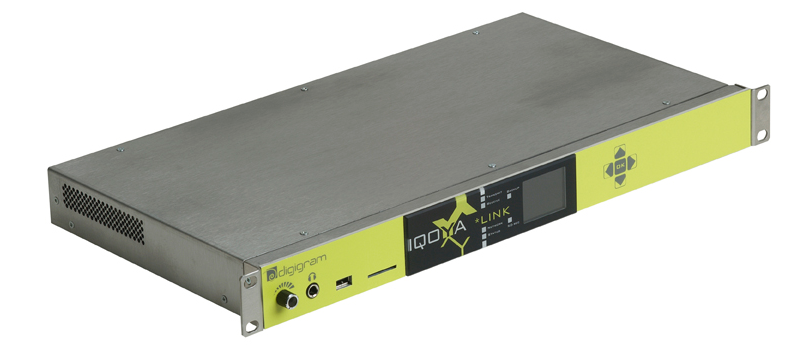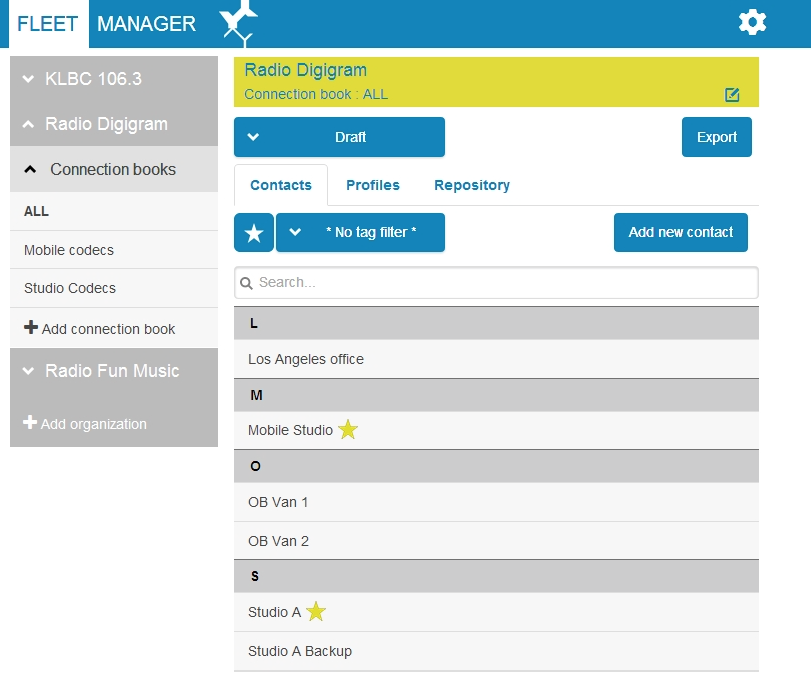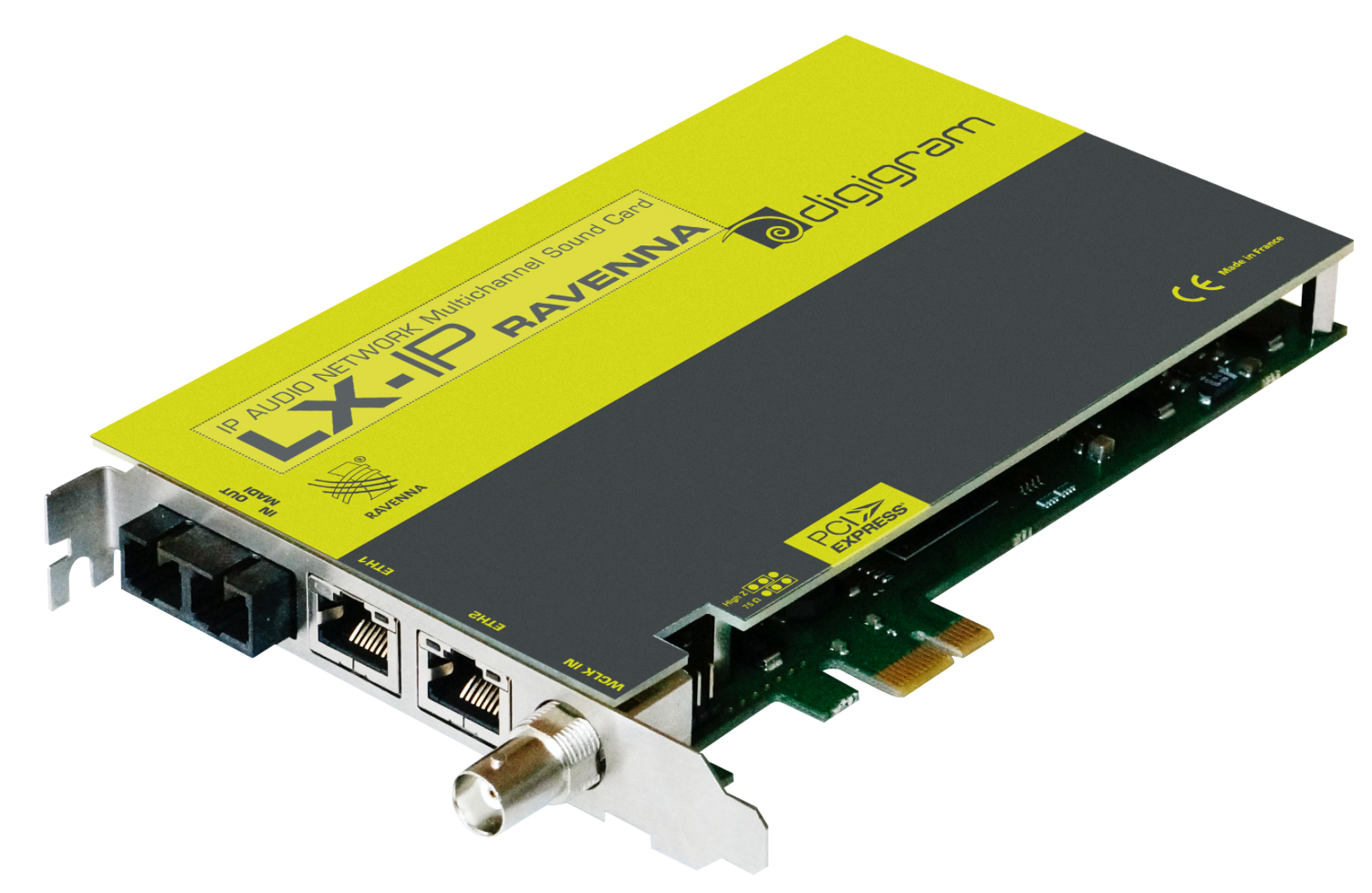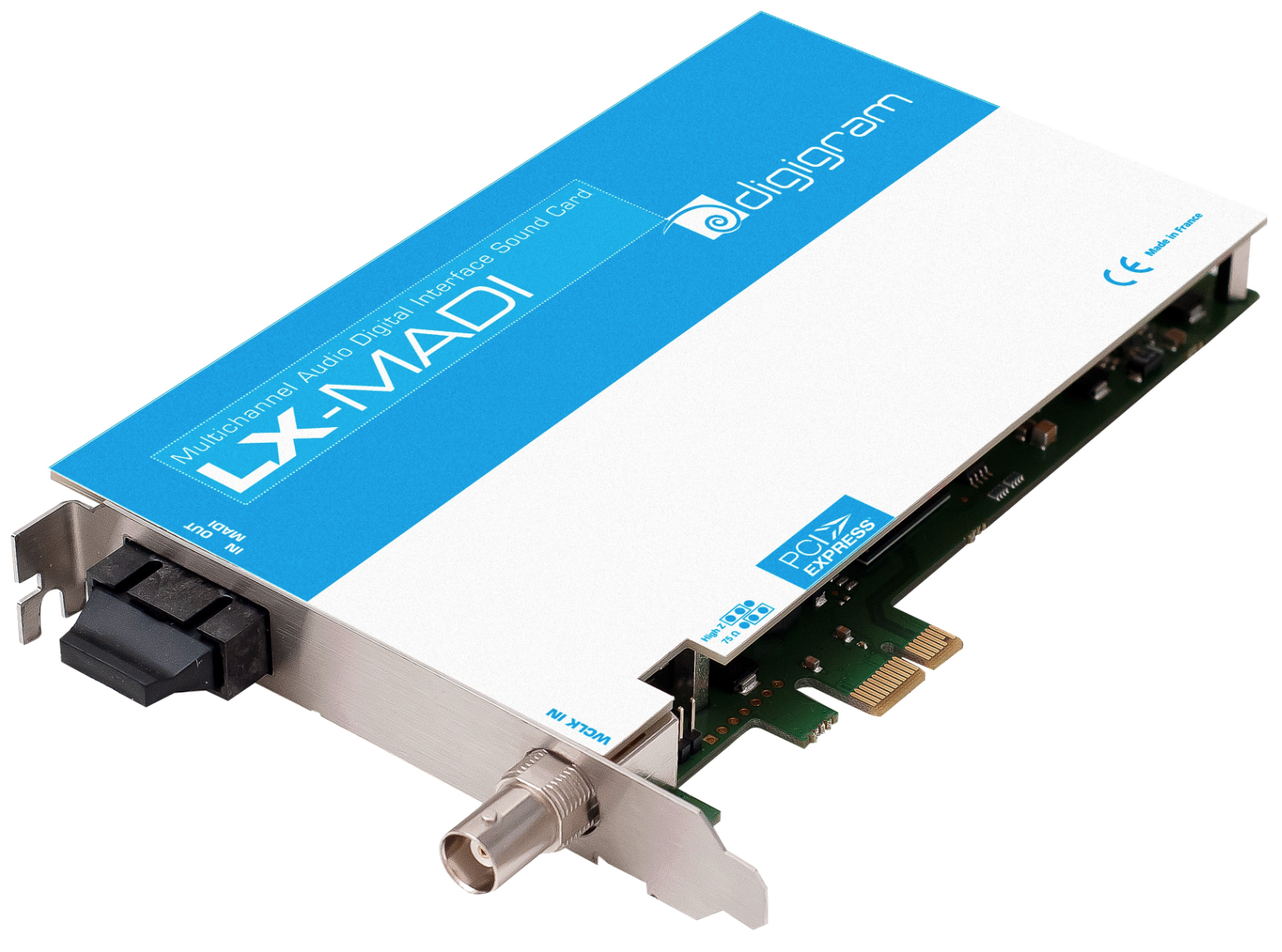[SatNews] Digigram will highlight a complete range of products designed to address the performance and cost requirements of all IP audio and video applications at CommunicAsoa2015 at Booth 5F6-05.
In showcasing solutions that simplify the capture and delivery of high-quality audio over IP networks, the company will feature the new IQOYA *CLOUD Web-based management application, as well as the company's low-cost, ultra-low-latency IQOYA *CALL and IQOYA *CALL/LE audio-over-IP contribution codecs; the IQOYA *LINK and IQOYA *LINK/LE stereo audio-over-IP distribution codecs; and the high-density IQOYA *SERV/LINK multiple-stereo or multichannel audio-over-IP codec for professional IP audio distribution.
Digigram provides professional-grade sound cards, and will show its new low-latency, high-density LX-IP RAVENNA PCIe sound card with a MADI option and LX-MADI PCIe® sound card. Digigram will make its first introduction of the AQORD HEVC video-over-IP contribution encoder to the Asia market.
Audio-Over-IP Distribution Range

IQOYA *SERV/LINK Multiple-Stereo or Multichannel Audio-Over-IP Codec for Professional IP Audio Distribution
IQOYA *SERV/LINK Multiple-Stereo or Multichannel Audio-Over-IP Codec for Professional IP Audio Distribution—Digigram's IQOYA *SERV/LINK incorporates multiple distribution codec instances and the company's advanced FluidIP™ technology on a single processing hardware platform to simplify the transport of multiple audio programs (mono, stereo, multichannel) over IP networks in a high-density format. Designed for radio broadcasting and for intercom and commentary for both radio and TV, the IQOYA *SERV/LINK codec enables users to configure multiple-stereo or multichannel solutions for links between studios and between the studio and transmitters, DVB operators, or content delivery networks.
In its compact 1-RU version, the solution can handle up to eight stereo analog channels, 16 stereo AES/EBU channels, 32 stereo MADI channels, or multichannel LAN IP audio interfaces (Livewire and RAVENNA), and up to 64 codecs with multiple GPIOs and RS232 ports for auxiliary data tunneling. The scalability of the system allows users to mix and expand the supported audio I/Os, and a larger 4-RU version provides even higher channel density. The solution supports analog, AES, MADI, Livewire, or RAVENNA audio connectivity and multiple audio codecs (PCM, MPEG L2 and L3, AAC, apt-X), and it is one of the industry's few audio-over-IP codecs that can simultaneously stream raw RTP, HTTP, and MPEG-TS/IP streams.

IQOYA *LINK and IQOYA *LINK/LE Audio-Over-IP Codecs
IQOYA *LINK and IQOYA *LINK/LE Audio-Over-IP Codecs—The IQOYA *LINK and IQOYA *LINK/LE audio-over-IP codecs are full-duplex encoding and decoding solutions that provide uncompromising performance for IP-based studio-to-studio and studio-to-transmitter links, as well as audio program delivery to DVB operators. Developed in collaboration with major European telcos, the IQOYA *LINK/LE codec is a cost-effective version of Digigram's full-featured IQOYA *LINK codec that gives broadcasters the benefit of 24/7 reliability, audio format flexibility, ease of use, and affordability.
Based on FluidIP™ technology, the smart IP audio streaming engine developed by Digigram, both IQOYA *LINK and IQOYA *LINK/LE provides high field-proven mean-time between failures (MTBF), very low back-to-back latency, and a host of state-of-the-art features that guarantee audio quality and continuity. With audio synchronization based on Network Time Protocol (NTP), these Digigram solutions enable operators to provide a seamless listening experience for users on the go— even as they move among the contiguous transmitters used in a multifrequency network. An intuitive Web-based user interface simplifies configuration, control, and monitoring and gives users access to real-time metrics on the network.

IQOYA *CLOUD Speeds and Simplifies Management and Operation of AoIP Contribution Codecs
Cloud-Based Codec Management
IQOYA *CLOUD Speeds and Simplifies Management and Operation of AoIP Contribution Codecs—Digigram will present the full release of the company's new IQOYA *CLOUD at BroadcastAsia2015. The Web-based application, which can be hosted privately on any virtual machine or operated as SaaS in the cloud, enables structured management and seamless operation of all deployed audio-over-IP (AoIP) remote live contribution codecs. Accessible from anywhere through the Web browsers of Internet-connected devices such as PCs, tablets, and smartphones, the application automatically synchronizes phone books, connection profiles, and "favorite" groups of codecs to dramatically simplify deployment and day-to-day operation of the full codec fleet. Today this application is specifically dedicated to the management of contribution codecs, in particular the IQOYA *CALL and IQOYA *CALL/LE. The release of the IQOYA *CLOUD is the first step in Digigram's larger rollout of cloud-based AoIP solutions.
Audio Production

LX-IP RAVENNA PCIe® Sound Card
LX-IP RAVENNA PCIe® Sound Card
The LX-IP RAVENNA PCIe® sound card, the first RAVENNA/AES67-enabled product developed by Digigram, features ultra-low latency — down to one audio sample per IP packet — and up to 256 RAVENNA I/O channels from multiple RAVENNA/AES67 streams. Ideal for high-density audio production or automation applications in radio and TV broadcast studios, this solution makes it easy for users to record and play as many as 128 audio-over-IP RAVENNA/AES67 channels simultaneously in and out of a desktop computer. Boasting ultra-low round-trip latency down to 3 milliseconds, interoperability with all AES67 requirements, an embedded 128 x 128 switching matrix, PTP grandmaster clock abilities, and high redundancy assured by two Gigabit Ethernet connections, this reliable hardware solution enables broadcasters to maintain high performance regardless of the computational load presented by other applications running on the host system. The MADI option facilitates a seamless transition by supporting use of the LX-IP RAVENNA/AES67 sound card in a synchronous audio environment to connect up to 64/64 I/O MADI channels from/to the host PC and from/to RAVENNA/AES67 audio-over-IP equipment via an embedded routing matrix.

New LX-MADI PCIe® Sound Card
New LX-MADI PCIe® Sound Card—During BroadcastAsia2015, Digigram will showcase the new LX-MADI PCIe® sound card, designed to provide radio and television broadcasters with reliable multichannel synchronous audio PC connectivity in high-density audio production and automation applications. Equipped with an optical MADI interface, the card supports a 64/64 I/O channel count with low roundtrip latency down to 3 milliseconds. Embedded 64 x 64 routing gives users direct monitoring capabilities, along with record and play functions. Because the LX-MADI card is a hardware solution, it offers high stability regardless of the computational load presented by other applications— editing, processing, ingest, playout—being supported by the host system.
New Video-Over-IP Contribution Product
AQORD HEVC Encoder—Digigram's new AQORD HEVC encoder helps production operations to reduce the cost of high-volume data transport by encoding in real time either one UHD signal or multiple HD raw video signals using the new HEVC video compression standard. While the unit is intended for use in point-to-point broadcast contribution, such as when transporting video from a live event to the studio, its unique combination of size and functionality makes it particularly valuable for contribution applications in space-constrained OB vans. The HEVC encoder fits into a 19-inch short-depth chassis that uses just one rack unit of space—the same form factor as a standard contribution encoder. Such a form factor reduces power consumption and takes up less room inside an OB van. The appliance ingests video from SDI inputs, encodes one raw UHD video signal or up to four simultaneous raw HD video signals using HEVC, then streams the encoded video over IP to the broadcaster's production base.

